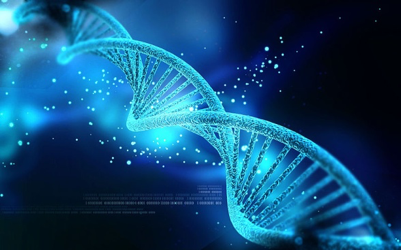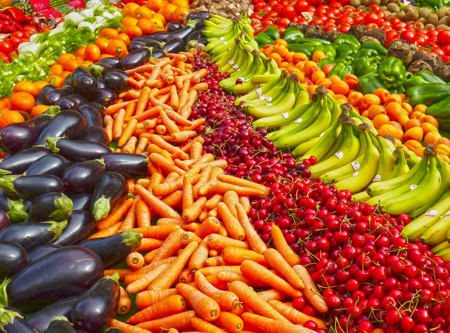Food is many things to us, nourishment, comfort, energy, social connection, pleasure or more. But not everyone realizes that food is also information and medicine to your body. Recent research has uncovered how various foods can turn on and off expression of our genes. Each cell contains DNA, the genetic material passed on to us by our parents. This DNA is a vast wealth of information stored in the nucleus of the cell, like a library. The genes are segments of DNA with specific instructions, like books in the library that contain blueprints.
For example, the information in genes determines  our hair and eye color. Genes also contain the information to build proteins that do the work of our body. For example, a gene contains the information to make insulin that helps us utilize our blood sugar properly. We have almost 20,000 genes in the human genome (genome is the name for all the genes collectively)(1).
our hair and eye color. Genes also contain the information to build proteins that do the work of our body. For example, a gene contains the information to make insulin that helps us utilize our blood sugar properly. We have almost 20,000 genes in the human genome (genome is the name for all the genes collectively)(1).
Food as Information
Most of the genes are formulas for making specific chemical structures or messengers. Dr. David Perlmutter discusses in his article how some foods can instruct your body to turn off inflammation while others turn on the inflammation messengers. Since chronic inflammation is an underlying cause of many chronic diseases, we can begin to understand that what we eat may cause us to feel better or worse. Food can signal how our bodies manage hunger and weight issues and more.
We know some people have food allergies or intolerances and have undesirable reactions to food. But most are unaware that the food we eat is sending subtle signals to our body by our day to day choices. We can feed the fires of inflammation by eating greasy burgers and sugary treats or we can dampen those fires by eating blueberries and broccoli.
Food as Fuel
Our food supplies our energy source. Scientific America discusses how when food is assigned a calorie count, it indicates how much heat energy can be released by that amount of food. The parts of our food that can produce energy are called macronutrients and they are further divided into carbohydrates (sugars and starches), proteins, and fats. Sugar and fat are fuels, and sugar is the main fuel for most of us. This burns faster, but dirtier, leaving more byproducts that can become inflammatory. Fat is the more efficient, cleaner burning fuel, which is why fat is the choice storage form for fuel for our body. It can also be used for structural material. The protein is used mostly as building blocks but can be turned into sugar to be burned.
Food as Medicine
Our food also contains ingredients that are not burned as fuel but are also important, such as vitamins, minerals, fiber, and phytonutrients. Collectively, they are referred to as micronutrients. Phytonutrients are chemicals that plants produce to help them thrive in their environment. Some help them ward off attacks from viruses, bacteria, fungi, or pests. They give the plant a survival advantage and often similarly help our bodies. Some are antioxidants or help fight infections, inflammation, and even cancer. The deep color of plant-based foods often comes from the phytonutrients. Vitamins derived their name from being substances found to be vital for our well being. They are often required to carry out important functions, such as being able to turn sugar into energy. Minerals are also very important. For example, magnesium is thought to be involved in 300-400 different biochemical processes in our bodies. Fiber is very important for bowel health and helps feed the helpful bacteria in our gut.
bodies. Some are antioxidants or help fight infections, inflammation, and even cancer. The deep color of plant-based foods often comes from the phytonutrients. Vitamins derived their name from being substances found to be vital for our well being. They are often required to carry out important functions, such as being able to turn sugar into energy. Minerals are also very important. For example, magnesium is thought to be involved in 300-400 different biochemical processes in our bodies. Fiber is very important for bowel health and helps feed the helpful bacteria in our gut.
So, as you can see getting the right macro- and micronutrients is key.
The SAD Diet
Our Standard American Diet (SAD) is truly sad when it comes to our health. It is full of the wrong fats, laced with refined sugars, loaded with chemicals, and too low in fruits and vegetables. It is not surprising, as discussed in this and this article, that when native populations become civilized and start eating a Western diet, they often develop diabetes, hypertension, obesity, heart disease, and more, often in one generation.
Healthy Choices
Don’t despair! By making some different food choices, you can promote health in your body and slow down the disease processes. Some simple healthy choices can make a big difference.
- Eat more fruits and vegetables. Most people don’t get up to the 5-9 servings a day recommended by our government, but that would be a good start.
- Reduce sugar intake. Most sugary foods contain lots of calories and very little nutrition, so it leaves your body hungry, looking for the missing nutrients.
- Eat fresh when possible and avoid the highly processed foods. Much nutrition is lost in the processing. The extra chemicals and preservatives required to give it a shelf life are often unwanted by our bodies, or even toxic.
- Eat a variety. Choose many different kinds of fresh foods and all sort of colors in your fruits and vegetables to get the most nutrition. Don’t be afraid to try something new.
- Choose healthy fats. Avoid processed vegetable oils that go rancid easily. Avoid a lot of meat fat if the animals were raised in concentrated feeding operations. Choose naturally fatty foods like olives, avocados, coconut oil, raw nuts, and seeds. Wild game, wild salmon, grass-fed dairy and grass-fed beef are examples of better choices for animal fats.
Make it a Lasting Habit
 Making gradual changes will give you the best chance to stick to your new nutrition plan. This is not a quick fix or a crash diet. For health, you need to have these changes become a new permanent lifestyle. This is often the secret of people who have lost significant amounts of weight and kept it off.
Making gradual changes will give you the best chance to stick to your new nutrition plan. This is not a quick fix or a crash diet. For health, you need to have these changes become a new permanent lifestyle. This is often the secret of people who have lost significant amounts of weight and kept it off.
Remember, food is more than just something to keep the hunger away. Feed your body information and nutrition that can lead to improved health and better weight management.
I’d leave to hear about your struggles or triumphs with food! Leave a comment below.





This is an awesome website. I will be keeping this one. As a person who has had little success with medications and even some supplements, “food as medicine” is what has helped me the most. You have explained this complex subject in simple terms that are doable. I would be interested if anyone knows of some classes available.